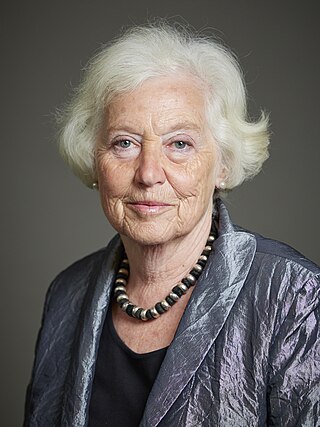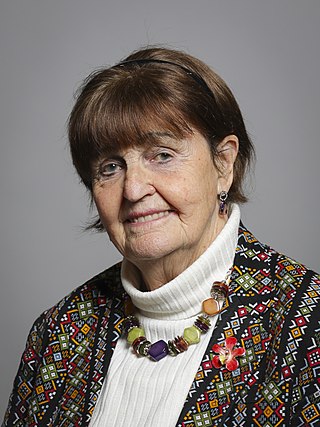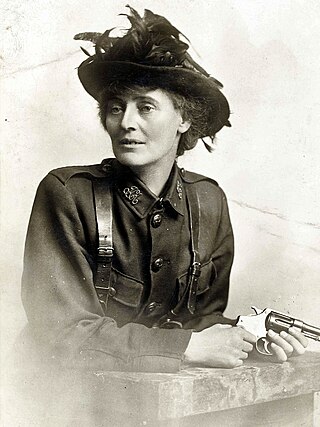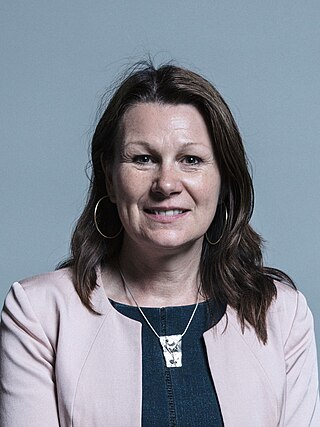
The House of Lords is the upper house of the Parliament of the United Kingdom. Like the lower house, the House of Commons, it meets in the Palace of Westminster in London, England. One of the oldest institutions in the world, its origins lie in the early 11th century and the emergence of bicameralism in the 13th century.

The Speaker of the House of Commons is the presiding officer of the House of Commons, the lower house and primary chamber of the Parliament of the United Kingdom. The current speaker, Lindsay Hoyle, was elected Speaker on 4 November 2019, following the retirement of John Bercow. Hoyle began his first full parliamentary term in the role on 17 December 2019, having been unanimously re-elected after the 2019 general election.

Betty Boothroyd, Baroness Boothroyd, was a British politician who served as a member of Parliament (MP) for West Bromwich and West Bromwich West from 1973 to 2000. A member of the Labour Party, she served as Speaker of the House of Commons from 1992 to 2000. She was previously a Deputy Speaker from 1987 to 1992. She was the first and to date only woman to serve as Speaker. Boothroyd later sat in the House of Lords as, in accordance with tradition, a crossbench peer.
A crossbencher is a minor party or independent member of some legislatures, such as the British House of Lords and the Parliament of Australia. They take their name from the crossbenches, between and perpendicular to the government and opposition benches, where crossbenchers sit in the chamber.

The House of Lords Act 1999 is an act of the Parliament of the United Kingdom that reformed the House of Lords, one of the chambers of Parliament. The Act was given Royal Assent on 11 November 1999. For centuries, the House of Lords had included several hundred members who inherited their seats ; the Act removed such a right. However, as part of a compromise, the Act allowed ninety-two hereditary peers to remain in the House. Another ten were created life peers to enable them to remain in the House.

Helene Valerie Hayman, Baroness Hayman, is a British politician who was Lord Speaker of the House of Lords in the Parliament of the United Kingdom. As a member of the Labour Party she was a Member of Parliament from 1974 to 1979. When she became an MP at age 25, she was the youngest MP of the 1974–79 Parliament. Hayman became a life peer in 1996.
In the United Kingdom, life peers are appointed members of the peerage whose titles cannot be inherited, in contrast to hereditary peers. Life peers are appointed by the monarch on the advice of the prime minister. With the exception of the Dukedom of Edinburgh awarded for life to Prince Edward in 2023, all life peerages conferred since 2009 have been created under the Life Peerages Act 1958 with the rank of baron and entitle their holders to sit and vote in the House of Lords, presuming they meet qualifications such as age and citizenship. The legitimate children of a life peer appointed under the Life Peerages Act 1958 are entitled to style themselves with the prefix "The Honourable", although they cannot inherit the peerage itself. Prior to 2009, life peers of baronial rank could also be so created under the Appellate Jurisdiction Act 1876 for senior judges.

Michael John Martin, Baron Martin of Springburn, was a Scottish politician who served as Speaker of the House of Commons between 2000 and 2009. A member of the Labour Party prior to becoming speaker, he was the Member of Parliament (MP) for Glasgow Springburn from 1979 to 2005 and for Glasgow North East until 2009. He was elected as Speaker of the House of Commons in 2000, remaining in the office for nine years until his involuntary resignation in 2009.

The Lord Speaker of the House of Lords is the presiding officer, chairman and highest authority of the House of Lords in the Parliament of the United Kingdom. The office is analogous to the Speaker of the House of Commons: the Lord Speaker is elected by the members of the House of Lords and is expected to be politically impartial.

Caroline Anne Cox, Baroness Cox, is a cross-bench member of the British House of Lords. She is also the founder of an organisation called Humanitarian Aid Relief Trust (HART). Cox was created a Life Peer in 1982 and was a deputy speaker of the House of Lords from 1985 to 2005, as well as being a minister in government. She was also a Baroness-in-Waiting to Queen Elizabeth II. She was Founder Chancellor of Bournemouth University, Chancellor of Liverpool Hope University from 2006 to 2013, and is an Hon. Vice President of the Royal College of Nursing. She was a founder Trustee of MERLIN Medical Emergency Relief International.

Frances Gertrude Claire D'Souza, Baroness D'Souza, is a British scientist and politician. She held the office of Lord Speaker from 1 September 2011 to 31 August 2016.

The representation of women in the House of Commons of the United Kingdom has been an issue in the politics of the United Kingdom at numerous points in the 20th and 21st centuries. Originally debate centred on whether women should be allowed to vote and stand for election as Members of Parliament. The Parliament Act 1918 gave women over 21 the right to stand for election as a Member of Parliament. The United Kingdom has had three female Prime Ministers: Margaret Thatcher (1979–1990), Theresa May (2016–2019), and Liz Truss (2022). The publication of the book Women in the House by Elizabeth Vallance in 1979 highlighted the under-representation of women in Parliament. In more modern times concerns about the under-representation of women led the Labour Party to introduce and, decades later, abandon all-women short lists, something which was later held to breach discrimination laws.
By-elections to the House of Lords occur when vacancies arise among seats assigned to hereditary peers due to death, resignation, or disqualification. Candidates for these by-elections are limited to holders of hereditary peerages, and their electorates are made up of sitting Lords; in most cases the electorate are those sitting hereditary peers of the same party affiliation as the departed peer.

An election for Lord Speaker, the presiding officer of the House of Lords took place on 13 July 2011, with the result announced five days later. Baroness D'Souza, Convenor of the Crossbench Peers, was elected after the 5th stage of counting. She took office on 5 September 2011.

Susan Mary Hayman, Baroness Hayman of Ullock is a British politician and life peer who has served as Parliamentary Under-Secretary of State for Environment, Food and Rural Affairs since July 2024. A member of the Labour Party, she was Member of Parliament (MP) for Workington from 2015 to 2019. Hayman served as an Opposition Whip from 2015 to 2016 and Shadow Minister for Flooding and Coastal Communities from 2016 to 2017, then as Shadow Secretary of State for Environment, Food and Rural Affairs from 2017 to 2019 and was appointed to the House of Lords in 2020.

An election for Lord Speaker, the presiding officer of the House of Lords, took place on 8 June 2016, with the result announced on 13 June. Incumbent Baroness D'Souza, who was at the end of her first term, announced on 11 February that she would not be standing for re-election.

The election for the 158th Speaker of the House of Commons took place on 4 November 2019. Lindsay Hoyle was elected with 325 votes in the final ballot, out of a total of 540 votes cast.














